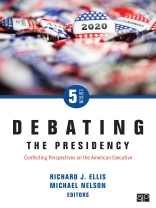The study of the presidency—the power of the office, the evolution of the executive as an institution, the men who have served—has generated a great body of research and scholarship. What better way to get students to grapple with the ideas of the literature than through conflicting perspectives on some of the most pivotal issues facing the modern presidency? Richard Ellis and Michael Nelson have once again assembled a cadre of top scholars to offer a series of pro/con essays that will inspire spirited debate beyond the pages of the book. Each essay—written in the form of a debate resolution— offers a compelling yet concise view on the American executive.
Содержание
Preface
Contributors
1. Resolved, the framers of the Constitution would approve of the modern Presidency
Pro: — David Nichols
Con: — Terri Bimes
2. Resolved, the unitary executive is a myth
Pro: — Richard J. Ellis
Con: — Saikrishna Prakash
3. Resolved, political parties should nominate candidates for the presidency through a national primary
Pro: — Michael Nelson
Con: — Andrew E. Busch
4. Resolved, the president should be elected directly by the people
Pro: — Burdett Loomis
Con: — Byron E. Shafer and Monica Busch
5. Resolved, the 22nd Amendment should be repealed
Pro: — David Karol
Con: — Thomas E. Cronin
6. Resolved, the new media has brought the president closer to the people
Pro: — Matthew R. Kerbel
Con: — Bruce Miroff
7. Resolved, presidential success and failure are better explained by political time and the strength of governing coalitions than a president′s character and leadership qualities
Pro: — Stephen Skowronek
Con: — Paul Quirk
8. Resolved, presidential power is (still) the power to persuade
Pro: — Matt Dickinson
Con: — George C. Edwards III
9. Resolved Congress should be required to vote up or down on legislation proposed by the president
Pro: — William G. Howell and Terry Moe
Con: — B. Dan Wood
10. Resolved, presidents have usurped the war power that rightfully belongs to Congress
Pro: — Nancy Kassop
Con: — Robert Bauer
11. Resolved, Congress should have the power to override a presidential pardon by a two-thirds majority vote of both houses
Pro: — Sharece Thrower
Con: — Jeffrey Crouch
12. Resolved, executive orders and other unilateral presidential directives undermine democracy
Pro: — Gene Healy
Con: — Andrew Rudalevige
13. Resolved, the president has too much power in the selection of judges
Pro: — David A. Yalof
Con: — John Anthony Maltese
14. Resolved, the vice presidency should be abolished
Pro: — Douglas L. Kriner
Con: — Joel K. Goldstein
Chapter 1: Resolved, the framers of the Constitution would approve of the modern presidency. — David Nichols, Terri Bimes
Chapter 2: Resolved, the unitary executive is a myth — Richard Ellis, Sai Prakash
Chapter 3: Resolved, political parties should nominate candidates for the presidency through a national primary. — Michael Nelson, Andrew Busch
Chapter 4: Resolved, the president should be elected directly by the people. — Burdett Loomis, Byron Shafer, Monica Busch
Chapter 5: Resolved, the 22nd Amendment should be repealed. — David Karol, Thomas Cronin
Chapter 6: Resolved, the new media has brought the president closer to the people. — Matthew Kerbel, Bruce Miroff
Chapter 7: Resolved, presidential success and failure are better explained by political time and the strength of governing coalitions than a president’s character and leadership qualities — Stephen Skowronek, Paul Quirk
Chapter 8: Resolved, presidential power is (still) the power to persuade. — Matt Dickinson, George Edwards
Chapter 9: Resolved Congress should have to vote up or down on legislation proposed by the president — Willliam Howell, Terry Moe, B. Wood
Chapter 10: Resolved, presidents have usurped the war power that rightfully belongs to Congress. — Nancy Kassop, Robert Bauer
Chapter 11: Resolved, Congress should have the power to override a presidential pardon by a two thirds majority vote of both houses — Sharece Thrower, Jeffrey Crouch
Chapter 12: Resolved, executive orders and other unilateral presidential directives undermine democracy. — Gene Healy, Andrew Rudalevige
Chapter 13: Resolved, the president has too much power in the selection of judges. — David Yalof, John Maltese
Chapter 14: Resolved, the vice presidency should be abolished. — Douglas Kriner, Joel Goldstein
Об авторе
Michael Nelson is Fulmer Professor of Political Science at Rhodes College and a senior fellow at the University of Virginia’s Miller Center. A former editor of the Washington Monthly, his most recent books include Trump’s First Year (2018); The Elections of 2016 (2018); The Evolving Presidency: Landmark Documents (2019); The American Presidency: Origins and Development (with Sidney M. Milkis, 2011); and Governing at Home: The White House and Domestic Policymaking (with Russell B. Riley, 2011). Nelson has contributed to numerous journals, including the Journal of Policy History, Journal of Politics, and Political Science Quarterly. He also has written multiple articles on subjects as varied as baseball, Frank Sinatra, and C. S. Lewis. More than fifty of his articles have been anthologized in works of political science, history, and English composition. His 2014 book, Resilient America: Electing Nixon, Channeling Dissent, and Dividing Government, won the American Political Science Association’s Richard E. Neustadt Award for best book on the presidency published that year; and his 2006 book with John Lyman Mason, How the South Joined the Gambling Nation, won the Southern Political Science Association’s V.O. Key Award.












